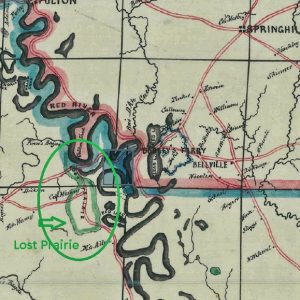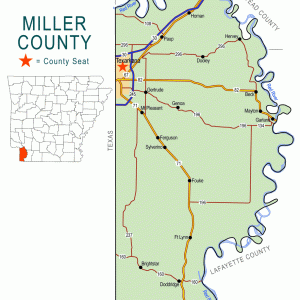calsfoundation@cals.org
Lost Prairie (Miller County)
The historical riverport community of Lost Prairie is located in modern-day Miller County, in an area along two oxbow lakes (First Old River and Second Old River) just off the Red River. The United States Geological Service’s designation for “Lost Prairie, Arkansas” places the community in an agriculture field near Red Chute creek, but historical documents and records describe the former community.
Lost Prairie was recognized as the first permanent settlement in the area in 1816, established by Colonel Benjamin Milam on the Red River, where he opened a store and land office. Several years later, U.S. government engineers informed Milam that his land at Lost Prairie was in Arkansas Territory, not Texas, as he had believed. Milam, who served with distinction in the War of 1812, was killed several years later in the days leading up to the Battle of the Alamo.
By 1819, a band of Cherokee led by Chief Duwali (a.k.a. John Bowles) moved from Missouri to the Lost Prairie area. Historical accounts indicate they spent enough time to harvest at least one crop before moving to present-day Dallas, Texas.
Congressional reports indicate that Lost Prairie was one of only fifteen “principal” post offices authorized by Congress operating in Arkansas Territory in 1828. In 1833, the parents of Augustus Hill Garland moved to Lost Prairie from Covington, Tennessee, to open a general store when he was an infant. Nearby Garland (Miller County) is named in his honor.
Political bickering between Major William Fontaine Pope, who was the nephew of Arkansas territorial governor John Pope, and Arkansas Advocate newspaper writer C. F. M. Noland resulted in a duel at Lost Prairie just prior to statehood. Both parties traveled from Little Rock (Pulaski County) to Lost Prairie (land still owned by Col. Milam) on February 4, 1831. In the duel the next morning, Pope was hit in the leg between the knee and the hip and fell to the ground. Noland was unscathed. Numerous accounts of the duel are found throughout Arkansas historical reports, and Col. Milam is identified as both a witness to the duel and the owner of the home Pope was taken to after being wounded. While Pope and Noland would reconcile in the following weeks, the wound proved to be fatal, as Pope died several months later after his return to Little Rock.
Recently defeated Tennessee congressman Davy Crockett visited Lost Prairie in 1835 as he traveled through Arkansas en route to the Alamo. While Crockett’s travel through Arkansas is well documented, it is perhaps a letter from a Lost Prairie resident, Isaac Jones, to Crockett’s widow, Elizabeth, after his death, that gives the best evidence of his visit. In the letter, Jones wrote: “Last winter, Colonel Crockett…passed through Lost Prairie, on the Red River, where I live…the Colonel visited me the next day, and spent the day with me. He observed, whilst here, that his funds were getting short, and proposed to me to exchange watches. He priced his at thirty dollars more than mine, which sum I paid to him, and we accordingly exchanged…I was gratified at the exchange, as it gave me a keepsake which would remind me of an honest man, a good citizen, and a pioneer in the cause of liberty…the object of this letter is to beg that you will accept the watch which accompanies it…please accept, dear madam, for yourself and your family.” Many historians speculate that Crockett’s wife and family likely learned of his March 6, 1836, death through this correspondence.
As Arkansas entered the Union in 1836, Lost Prairie’s significance as a riverport and commerce center was lost to Fulton (Hempstead County) and Washington (Hempstead County) to the north, and Garland and Shreveport, Louisiana, to the south. Advancements in farming coupled with population decline led to Lost Prairie’s loss of prominence.
For additional information:
Early Days in Arkansas; Being for the Most Part Personal Recollections of an Old Settler, Judge William F. Polk. Little Rock: Allsopp Publishing, 1895.
“Time Tracks.” Texarkana Gazette, December 31, 1999, pp. 1C, 2C.
White, Lonnie J. “The Pope-Noland Duel of 1831: An Original Letter of C. F. M. Noland to His Father.” Arkansas Historical Quarterly22 (Summer 1963): 119–123.
“Who Will Go with Old Ben Milam into San Antonio?” San Antonio Express, February 2, 1930.
Len Pitcock
Hot Springs, Arkansas
 Lost Prairie Location
Lost Prairie Location  Miller County Map
Miller County Map 




Comments
No comments on this entry yet.